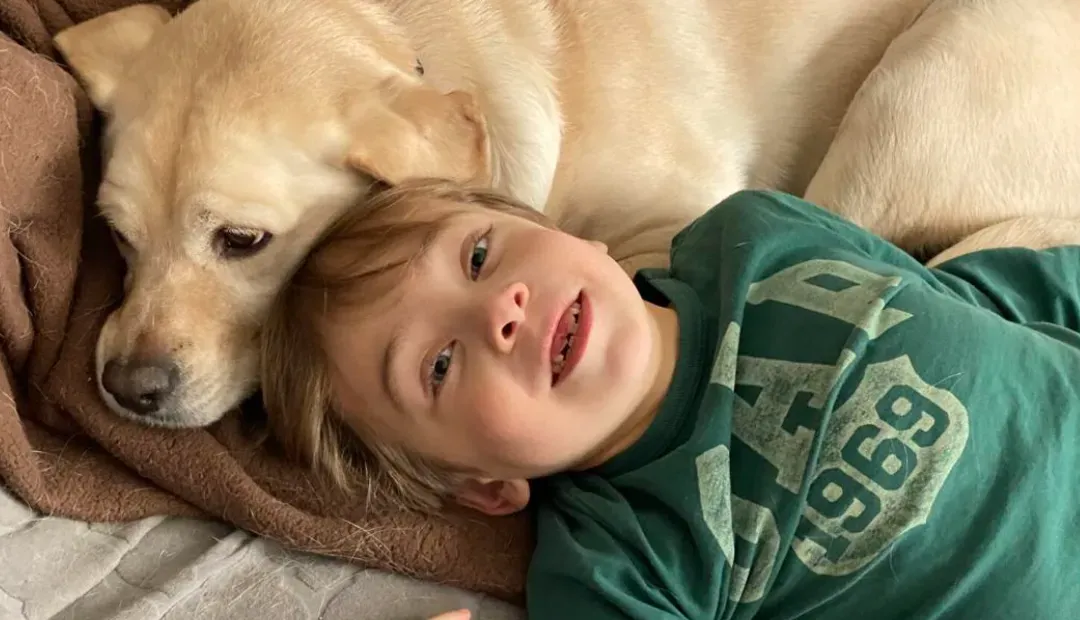According to The Courier Journal, it is important to keep in mind that lawsuits only present one side of the story. However, the heartbreaking claims made in the lawsuit filed by Chris and Sally McCullum on behalf of their son Finnley against Norton Healthcare in July are sure to tug at your heartstrings.
Steve Joffe, the chairman of medical ethics and health policy at the University of Pennsylvania, expressed his deep sorrow upon hearing the tragic tale.
In 2014, Finnley came into the world with a congenital heart defect, which posed a challenge for him throughout his life. He had to endure five open-heart surgeries and numerous hospital stays. Sadly, one of these stays occupied the last year of his life.
According to his parents’ obituary, he was someone who cherished life and radiated “pure joy and happiness.”
As a typical 8-year-old, he had a love for all things spicy and the hotter, the better. Along with his love for spice, he also had a fascination for creepy and scary stuff. He enjoyed listening to a wide variety of music, from classic bands like the Beatles to modern-day artists like BTS and rapper Tay-K, which he would often play at full blast on his music system.
Finnley’s favorite thing to do was to spend time with his parents. It didn’t matter whether they were at the zoo or Walt Disney World, or simply walking through a stream, exploring everything around them. He cherished these moments with his family above all else.
After undergoing a heart transplant last year, he had hoped for a chance at a healthy life. Unfortunately, his body rejected the transplant after only a few hours, leaving him with limited options for his health.
According to his parents, he was kept alive for 8 1/2 months with the help of a ventilator, dialysis, and a “bridge heart” at the suggestion of his treatment team at Norton Children’s Hospital, until he could receive another transplant.
According to the McCullums’ lawsuit, which was filed in Jefferson Circuit Court, Norton informed them in April that Finnley had been taken off the transplant list. The couple further alleges that the hospital made the decision to withdraw life-sustaining medical care without any consultation, which would ultimately result in Finnley’s passing.
According to the McCullums, Norton assured them that their son, Finnley, would not suffer any pain or fear during the withdrawal of his care. However, their heartbreaking claim is that Finnley spent his final hour on this Earth in excruciating pain and terror, crying out for his parents to come to his aid. The family’s grief is compounded by the belief that their child’s suffering could have been avoided if only the promises made to them had been kept.
According to reports, when he was in critical condition, his loved ones could only offer him false reassurance that everything would be okay. Unfortunately, he passed away on April 19.
In their response to the lawsuit, the hospital company expressed their condolences to the McCullum family, acknowledging that they are going through a difficult time as they cope with the loss of their child to an untreatable illness. The company recognizes the overwhelming sadness that comes with such a devastating loss and extends its sympathies to the family during this trying time.
According to court documents, Norton disputes the claims made by the couple, stating that their facts are incorrect.
According to reports, Finnley was not considered for a second transplant after the first one was unsuccessful.
According to Norton, they did not make a unilateral decision to terminate Finnley’s life. The hospital’s ethics committee played a significant role in the decision-making process.
According to Norton, they followed all legal and ethical protocols when they made the difficult decision to discontinue Finnley’s care. Finnley’s treatment team had determined that continuing care would be futile and would not provide any benefit to him. Therefore, they made the tough call to withdraw his care, adhering to all necessary guidelines and regulations.
According to the hospital, the parents were given the option to pursue a court order to prevent the decision, but they chose not to do so.
During an interview, Ann Oldfather, the lawyer of the McCullums, mentioned that their main priority was to spend as much time as possible with Finnley, rather than in a courtroom.
According to medical experts who examined the case for The Courier-Journal, Norton acted correctly in the situation. Continuing care that was futile might have been considered unethical.
According to Arthur Caplan, who is the Director of the Division of Medical Ethics at New York University, there was no more that could have been done to save the situation. He mentioned that the predicament was quite dire and that restoring a heart without a transplant was practically impossible.
According to Bruce Jennings, the director of bioethics at the Center for Humans and Nature and an adjunct associate professor of health policy at Vanderbilt University, Norton should have presented Finnley’s parents with the choice to transfer him to a different hospital that would have provided ongoing medical care. Despite requests for comment on the matter, Norton has refused to provide any information due to privacy laws.
It appears that Norton’s handling of Finnley was in line with their policy and the standards set by the American Academy of Pediatrics. These guidelines prioritize the well-being, comfort, and respect of children during their final moments.
With a membership of 67,000, the organization acknowledges that pediatric patients are usually treated with the assumption of preserving life. However, they also understand that certain situations may call for a decision to forego life-sustaining medical treatment if it is deemed ethically advisable and the benefits outweigh the burdens for the child.
According to the policy shared by Norton with the newspaper, a physician in charge of a patient can choose not to administer life-sustaining treatment if it is deemed to be “non-beneficial,” meaning that it wouldn’t reverse the underlying medical condition, and only serve to prolong life. However, the policy also stipulates that the patient or their parent should be afforded the opportunity to transfer care to another hospital or take the matter to court if they wish to challenge the decision.
According to a group of twelve pediatric experts who authored a paper titled “Guidance for Forgoing Life-Sustaining Medical Treatment” in the professional journal “Pediatrics,” there are times when despite our best efforts, children may pass away. It is important for us to acknowledge the limits of our technology, as failing to do so may lead to a greater tragedy.
It is crucial to understand that attempting to “save” a child can sometimes have unintended consequences. In such situations, we may inadvertently deprive the child of the chance to be comforted and supported by loved ones, to have a proper farewell, and to receive the love and attention of those closest to them without any unnecessary interventions. It is important to remember that our focus should always be on the patient, rather than solely on the disease they are facing.
It is not uncommon for life-sustaining treatment to be withdrawn for children.
A study published by the National Institutes of Health revealed that a significant number of children, up to 60%, pass away in pediatric intensive care units after a decision to either withdraw or limit their treatment. This statistic sheds light on the difficult decisions that families and healthcare professionals have to make in such heartbreaking situations.
The McCullums’ lawsuit, seeking damages for the trauma inflicted on Finnley and his parents, is yet to receive a trial date.
It is possible that the outcome of the case hinges on whether Finnley was sedated appropriately by Norton prior to terminating his treatment.
According to the filed suit, Norton’s lawyer, Beth McMasters, responded in writing, stating that the medications used for sedation were administered and proved to be effective.
From the response, it appears that Finnley’s parents may have had a hand in interfering with the sedation process.
“If the plaintiffs had consented to the administration of the sedating medications that were ordered, their loved one would not have been conscious of the proceedings.”
According to McMasters, Norton executives have chosen not to provide further details regarding the issue. The reason behind this decision is that they do not wish to comment on the lawsuit unless the McCullums waive Finnley’s privacy rights. However, Oldfather stated that they would not be doing so as it is not legally required.
According to Oldfather, the McCullums made a concerted effort to shield Finnley from the truth of the situation. When asked about what they miss most about him, her answer was simple: “Everything.”
According to her, the McCullums were not ready to talk about Finnley’s tragic passing and declined to provide an interview. It appears that the family is still grappling with the pain of their loss and needs time to heal.
Finnley spent his childhood in Louisville and New Albany, Indiana. During his early years, he attended Grant Line Elementary School and made many memories there. His final resting place is at Holy Trinity Catholic Cemetery, located in New Albany, Indiana.
The McCullums expressed their profound grief and sorrow in the obituary of their beloved son, Finnley. They emphasized how his absence will be felt by all those who knew him, and how his memory will be held dear in the hearts of many.
“They spoke of him as a radiant and untainted beam of light,” they shared, “radiating pureness and compassion. He truly enhanced the quality of our world.”
You can easily get in touch with reporter Andrew Wolfson by giving him a call at (502) 396-5853 or by sending him an email at [email protected].
More News:
- 2 accused after Honea Path children found in ‘unsafe, unclean housing conditions’
- Public Assistance Needed to Identify Injured Woman at Houston Hospital



